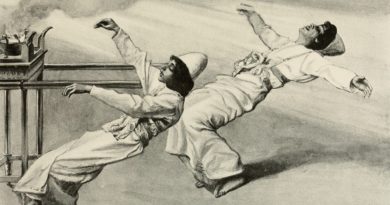Shemini 5767 – the power of silence
 And Nadav and Avihu, the sons of Aaron, took each of them his censer, and put fire in it, and put incense on it, and offered strange fire before the Lord, which he commanded them not. And there went out fire from the Lord, and devoured them, and they died before the Lord. Then Moses said to Aaron, This is what the Lord spoke, saying, I will be sanctified in them that come near to me, and before all the people I will be glorified. And Aaron held his peace. …Leviticus 10:1-3
And Nadav and Avihu, the sons of Aaron, took each of them his censer, and put fire in it, and put incense on it, and offered strange fire before the Lord, which he commanded them not. And there went out fire from the Lord, and devoured them, and they died before the Lord. Then Moses said to Aaron, This is what the Lord spoke, saying, I will be sanctified in them that come near to me, and before all the people I will be glorified. And Aaron held his peace. …Leviticus 10:1-3
Can you imagine the pride that Aaron must have felt when he was appointed high priest? Here he was, born and raised a slave in Egypt, yet he found himself appointed the highest religious authority of the Jewish people. And at the same time that Aaron was appointed Kohen Gadol his sons were appointed to the very important office of priest to serve the Jewish people and to serve God. When Aaron woke up on the morning where this week’s Torah portion, Shmini, begins–the eighth and final day of the inaugural ceremony–he probably told himself “it doesn’t get any better than this.”
If Aaron was like most parents, he probably took even more pleasure in the appointment of his sons than he did over his own appointment. We have so much love for our children, that in many ways we feel joy at their accomplishments even more strongly than we feel joy at our own accomplishments. What parent doesn’t know the happiness of watching his child shine?
The flip side of that joy is that if tragedy strikes, nowhere is it more deeply felt than if it strikes one’s children. Surely the most devastating thing to experience is the loss of a child.
For Aaron, that eighth day is surely one that tore his guts out. For on the same day that he celebrated the inauguration of his sons and himself, tragedy struck. Two of his sons, Nadav and Avihu, were struck down—they were killed for offering “strange fire.”
How did Aaron react? How would you react? The Talmud tells us (Chullin 78a) that when struck with calamity, a person should cry out, so that others will know and will pray for him.
Traditionally, when we hear the news of the death of a loved one, we tear our clothes and say a blessing, acknowledging God as the true judge. But sometimes, loss is too overwhelming for even that. And this was the case for Aaron. In this week’s parsha, after the loss of his sons, Moses says a few words of comfort, and we are told vayidom Aharon, and Aaron was silent. Vayidom – he was struck dumb. Sometimes words fail us, and the only possible response is silence.
And at times like this, silence is the appropriate response. Rashi tells us that Aaron received a reward for his silence. He didn’t do what I imagine most of us would do—cry out, complain, say it’s not fair. He didn’t argue. He accepted God’s judgment with silence.
There are many different kinds of silence. There is the companionable silence. The awkward silence. The uncomfortable silence. The commentators actually disagree about the nature of Aaron’s silence. While Rashi says that Aaron was rewarded for his silence—implying it was meritorious because it was difficult—Nachmanides presents a view that Aaron was silent because he was at ease. Ramban says Aaron was silent because Moses convinced him that the death of his sons WAS a kind of reward—his sons were so precious to God, they were even greater than Moses and Aaron themselves, and were sanctified to God.
But I have a problem with both of those interpretations. I don’t think the silence was difficult for Aaron, but I also don’t think it was the silence of being at e ase. Rather, I think it was the sort of silence spoken of in Psalm 39, “I was dumb with silence, I held my peace, had no comfort, and my pain was stirred up.” When experiencing tragedy, it is often impossible to find words: in the book of Lamentations we are told “The elders of the daughter of Zion sit upon the ground, and keep silence; they have cast up dust upon their heads; they have girded themselves with sackcloth; the virgins of Jerusalem bow down their heads to the ground.”
Our tradition tells us that the silence of Aaron instructs us in how to conduct ourselves when we confront profound loss. The Talmud tells us (Moed Katan 15a) “A mourner is forbidden to give the usual greeting [of wellbeing], because the All Merciful said to Ezekiel: Sigh in silence.” The mourner doesn’t give the usual greeting—meaning the mourner does not engage in idle chit chat. The same applies for one visiting a mourner. Some people are uncomfortable with the mitzvah of comforting mourners, because they feel they don’t know what to say. The custom when visiting a mourner is to say nothing—rather, to sit silently with the mourner, and let him initiate the conversation. Or not.
The central text of Jewish mysticism, the Zohar, sees God as being silent toward us as a sign of mourning over our long exile. In the Zohar we read “As long as the Community of Israel is in exile the Voice is withdrawn from her and the Word does not function, as it says, in Psalm 33 “I am dumb with silence.”
We feel sapped and drained when confronting loss. The prophet Isaiah said “Keep silence before me, O islands; and let the people renew their strength.” The Talmud teaches that silence not only gives us a chance to renew our strength, but in fact it is the best medicine all. Similarly, author and physician Rachel Naomi Remen says “The most basic and powerful way to connect to another person is to listen. Just listen. Perhaps the most important thing we ever give each other is our attention…. A loving silence often has far more power to heal and to connect than the most well-intentioned words.”
Silence itself can be a form of crying out. Chasidic texts tell us that the proper way to pray is “yelling out quiet.” To have all of the intensity of yelling to God in your prayers—but doing it quietly. Silence is actually quite versatile as a form of prayer. One of the favorite verses of Jewish meditators is a line from Psalm 65 which says lecha dumiya tehila, “Silence to you is praise.” We see other examples in Scripture of silence being a path to approach God. The prophet Habakuk said “But the Lord is in his holy temple; let all the earth keep silence before him.” Psalm 62 tells us “My soul waits in silence only for God; from Him comes my salvation;
My soul waits only for God in silence; for my hope is from Him.” We Jews like to talk so much that God even had to remind us to shup up when He wanted to speak to us. In Deuteronomy we read “הַסְכֵּת וּשְׁמַע יִשרָאֵל” “Be silent, and listen, Israel.”
As fond as Torah scholars seem to be of argumentation—and of yelling out not so quietly—it is interesting that the rabbis praised silence as a great virtue. In the Midrash R. Joshua b. Levi taught “A word is worth a sela, but silence is worth two, even as we have learned in the Mishnah: ‘All my life I grew up among the Wise, and I found nothing better for a person than silence.’”
The rabbis taught that a student who is silent when his teacher is angry with him will be rewarded with being able to distinguish between difficult ritual matters; a student who can be silent when his teacher is angry with him a second time will be worthy to serve as a judge on both capital and monetary cases. Why? A good judge needs to be able to sit quietly and hear all sides, not immediately want to jump up and argue his point.
A good judge of course also needs to be wise, and Pirkei Avot informs us that siyag l’chochmah shtikah, silence is a fence to wisdom. And if you aren’t actually wise, silence is clearly the best course, as we also learn from the sages (Pesachim 99a): “Silence is better for the wise, and how much more so for fools, as it is said, Even a fool, when he holds his peace, is counted wise.” Or, as Mark Twain put it, “It is better to keep your mouth closed and let people think you are a fool than to open it and remove all doubt.”
While silence is a virtue, there clearly is a place for words. As King Solomon said, “there is a time to be silent, and a time to speak.” Sometimes a person is rewarded for speech, and sometimes a person is rewarded for silence. As I mentioned earlier, Rashi taught that Aaron was rewa rded for his silence. But the Midrash also teaches that Moses was punished for his silence: “When the daughters of Jethro said, ‘An Egyptian delivered us out of the hand of the shepherds,’ and Moses heard and kept silence; therefore he is not to be buried in his land.” Moses should have corrected Jethro’s daughters—it wasn’t an Egyptian, but rather a Hebrew who delivered them out of the hands of the shepherds. The Midrash says Moses was punished for being ashamed of his humble origins.
If one is punished for being silent and allowing someone to have a falsely positive impression of you, all the more so one would be punished for being silent in the face of injustice. As Jews we are especially sensitive to this. If there had been more good people willing to speak up in the face of the horrors of the Holocaust, perhaps millions of lives could have been saved. That’s why this Sunday’s rally for the people of Darfur is being held at the Holocaust Memorial in Toledo. We have learned not be silent. As Dr. Martin Luther King, Jr. said, “We will remember not the words of our enemies, but the silence of our friends.”
King Solomon’s observation seems simple enough: “there is a time to be silent, and a time to speak.” Yet many people have trouble telling the difference, and nowhere is this more obvious than when it comes to communicating via e-mail. Because of my willingness to adopt unpopular political stands in op-ed pieces in the newspaper and on my blog, I have received hate e-mails that would embarrass a sailor. I have been called a liar, traitor, spy and agent provocateur for daring to point out to someone who was condemning slavery in Yemen that we also have slavery in Israel. And this is someone that I met personally, whom I am quite certain would not have said those things over lunch, in person. Some of the things I was called in the talkback section of the Jerusalem Post were even worse. The title of a blog entry by Merle sums it up: Rampant Rudeness on the Internet: What Would ‘Miss Manners’ Say?
Research conducted by the Pew Internet & American Life Project, found that 39% of American teens aged 12 to 17 said things over text messaging or instant messaging that they would not normally say to someone in person. We probably do that because our feelings are not tempered by the presence of the other person. Writing an e-mail is something you do by yourself looking at a computer screen. It feels more like being alone than like being in a conversation. Some people are not good at regulating themselves, they need the presence of other people to regulate them to social norms. Of course, some people, like Don Imus, seem to be utterly clueless and completely outside the realm of adhering to social norms. I bet Imus wishes he was a little bit better at keeping silent when it comes to making inappropriate comments!
The danger of possibly saying something in an e-mail that I would not say in person is one reason I do not set my e-mail program to send e-mails immediately. E-mails go to my outbox before being sent, and sometimes, after having written an e-mail, I’ll go back and decide to either edit it, or to delete it entirely. Sometimes you can get all the catharsis you need from writing a blistering email, without actually pushing the “send” button.
Keeping silent is not always easy. Mar the son of Ravina would pray for the ability to keep silent. His prayer can be found at the end of the Amidah: “My God, keep my tongue from evil and my lips from speaking guile. May my soul be silent to them that curse me and may my soul be as the dust to all.”
When you find yourself in a situation where you don’t know what to say, think of the example of Aaron in this week’s Torah portion. Sometimes the best thing to say is nothing. The historian Will Durant taught “One of the lessons of history is that nothing is often a good thing to do and always a clever thing to say.”
Shabbat Shalom
Reb Barry


